RIKLBLOG
|
| Tomorrow |
| 14-30 Sept. 2008 |
| Yesterday |
| Index |
| Eventide |
| SETI League |
| PriUPS Project |
| Bonus! |
| Contact |


Pasta Power — The Results
On logical yesterday I posed the question:
"How about a revolution in how you cook your pasta?"
And I proposed an experiment to determine if my ideas, like cooked pasta, held water.
The Results
First the incomplete news: As of today, 14 September, my result table remains empty. The expert panel has been busy with life, but several members report that they are unlimbering their pots.
New: As of 19 September - one result, with photos, and another as of the 30th. See below
| Panelist | Brand of Pasta | Type of Pasta | Cooking Time Following Directions |
Cooking Time Starting Cold |
Subjective Pasta Quality Report |
| Terry | Hodgson Mill | Whole wheat angel hair | 26 min | 23 min | Yucky and mushy |
| Karen | Ronzoni | Spaghetti Ordinaire | 27.5 min | 24.5 min | Normal - no difference |
| Emily | Trader Joe's | Various | Unknown | Unknown | See update 15 November 2008 |
| Prof. Georgio Parisi* | Not Given | Various | See article | See results from a Nobel Prize winner! |
But there have been some encouraging words. One panelist, Deb of Altered Plates, suggested the following:
I always boil the salted water, throw in the pasta, bring it to a boil, stir then turn off. By the time I'm done heating the sauce and making the other parts of dinner, the pasta is cooked! And, I saved a little natural gas.
This is a splendid suggestion, and clearly it works for her. Just as clearly, it saves energy since instead of an extra ten minutes of boiling, only a few seconds are required. My hesitation in fully endorsing it springs from the uniqueness of her situation. What if she used a different size pot, for example? Would the pasta be over- or under-cooked? Further correspondence revealed:
As far as the cooking time goes and the pot size, the pot size DOES matter. The larger the pot, the better the results. Pasta needs a lot of room to move around as it boils. Sitting time: minimum 6 minutes. Max: 15, otherwise the pasta will be over cooked.
This neither verifies nor negates my hypothesis that it is OK to cook pasta starting in cold water and waiting for it to get hot; her scheme is the inverse. For experimental evidence we await further expert checks-in... (I will not turn this into yet another blog item, but rather add the results to the table above as they become available.)
Our wait has been worthwhile. Terry and Karen have checked in with some results, albeit contradictory ones:
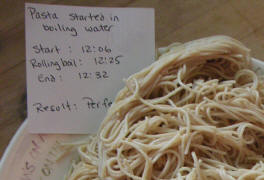 |
Terry's Test At the left: normally cooked spaghetti. At the right: the experimental subject. About which it would be fair to say "yecch." I saw it in person. Mush. |
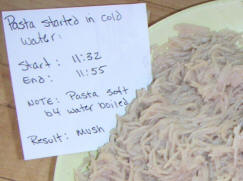 |
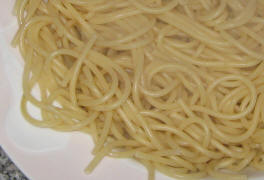 |
Karen's Experiment At the left: normally cooked spaghetti. At the right: the experimental subject. About which it would be fair to say "identical." They both came out the same, again by personal observation. |
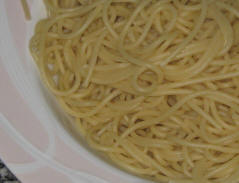 |
What to make of this? In the first case, my hypothesis is trashed along with the angel hair whole wheat pasta. In the second case, my point is proved, energy saving, quality, and all. Was it the whole-wheatness or the thinness of the angel hair that did it in? Perhaps a future reader will enlighten us. Meanwhile, I think it would be fair to conclude the following:
If you cook a lot of pasta at home, there is definitely the possibility of an energy saving using either the Deb or the Richard method. At worst you will sacrifice a moiety of one box of pasta to find out, and with success your energy savings will stretch far into the future. Give it a try; feel free to let me know if it works out. I'm now declaring this specific blogitem "closed."
I Haven't Forgotten
(14 September 2008) When the experiment is complete, I will name the small town the can be powered by the energy saved by cooking pasta using the RIKLBlog protocol.
(30 September 2008) And here's the calculation:
1: It takes about 10 minutes to boil 3 quarts of water (in the Karen experiment and perhaps others). Since the flame is much hotter than either the cold or boiling water, it is reasonable to assume that the temperature of the water increases linearly from "cold" (10 degrees C) to boiling (100 degrees C) since there are no phase changes involved.
2: With 3000 ml of water to heat and a temperature increase of about 9 degrees C per minute, one calculates that the three minute difference in full-flame time corresponds to (3*9*3000) calories, or 81kCal. This is almost .1 kWh, or a saving of 5 kilowatt-hours every year, assuming you cook pasta once per week. In fact, it's probably much more of a saving, since the energy from burning gas isn't transferred to the water with full efficiency. Of course, some households have pasta almost daily, and some not at all.
3: Not having a more precise way to estimate the number of pasta-household-weeks in the United States with any precision, let's just guess that 100 million "households" could save 5 kWh each, which corresponds, of course, to 500 million kWh per year ($50 million!) of total energy saving.
4: The average household uses about 1000 kWh per month, or 12,000 kWh per year. Which means that just the energy saved by starting your pasta in cold water could power a town of 40,000 people!
5: Unfortunately, the analysis above is riddled with potentially bad estimations. The worst is the determination of the "doneness" of the spaghetti. Although two people carefully consumed a strand every half minute or so and compared notes, there is no spaghettometer to determine when one strand has reached ripeness, and it's almost inevitable that there was perhaps as much as a full minute error, which would translate to the town population being many thousand lesser or greater.
Accordingly, any town with a population of from, say, 20,000 to 60,000, would probably be of an appropriate size to benefit from the cast-off energy of America's pastafarians. There are a lot of towns in that range, so I'm just going to pick one I've heard of. The winner is...
Botany Bay, Australia!
Free electricity to Botany Bay for a year. Or elbow macaroni. Your choice.
Fun With Mirrors Follow-Up
A year ago, almost to the day, I wrote a three-part blogitem proposing a somewhat novel suggestion about how to "remediate" one's vehicular carbon dioxide emissions without sending someone else money. Although I didn't expect my proposal to result in a world-wide shortage of parking lot striping paint, I was hopeful that it would get people thinking about the subject. Just today, thanks to reader Tom, I have found out that at least three people, the authors of "White Roofs Cool the World, Offset CO2, and Delay Global Warming," have been doing just that. These people are real scientists. If you don't believe me and are too busy to read their summary, just note the following: Their address for further inquiry is on "One Cyclotron Road."
Potatoes Float, Clams Sink
There's no long great story that engendered that heading. In fact there's hardly even a short, stupid one. But it's something to remember should you find yourself tasked with evaluating New England clam chowder. Happy to be of help.
* Update 5 January 2023! A Nobel Prize-winning professor has the (presumably) last word.
| Special Advertising Section | ||
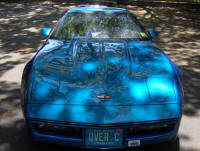 |
Please buy this lovely blue
Corvette ZR1!
(The Mitsubishi has been sold, and the buyer (from South Dakota!) has it safely home.) |
|
NP: "Up the Neck" - The Pretenders
| © 2008 |
| Richard Factor |